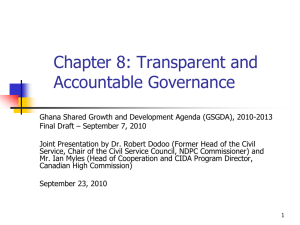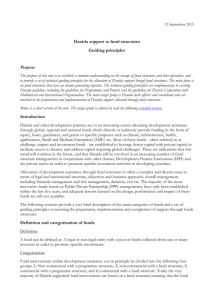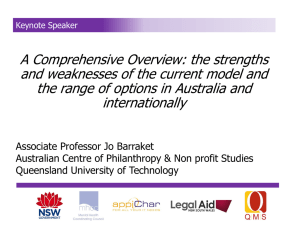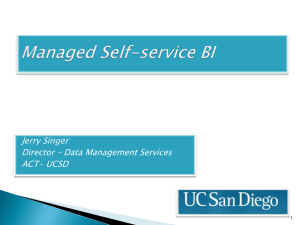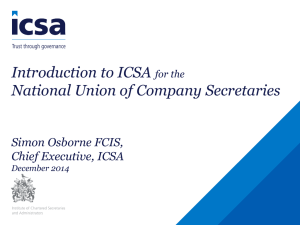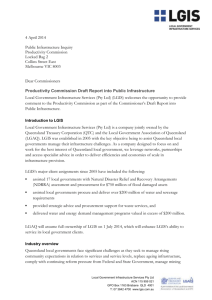Enhancing Local Government Capacities in Bangladesh 03-Feb-2011
advertisement
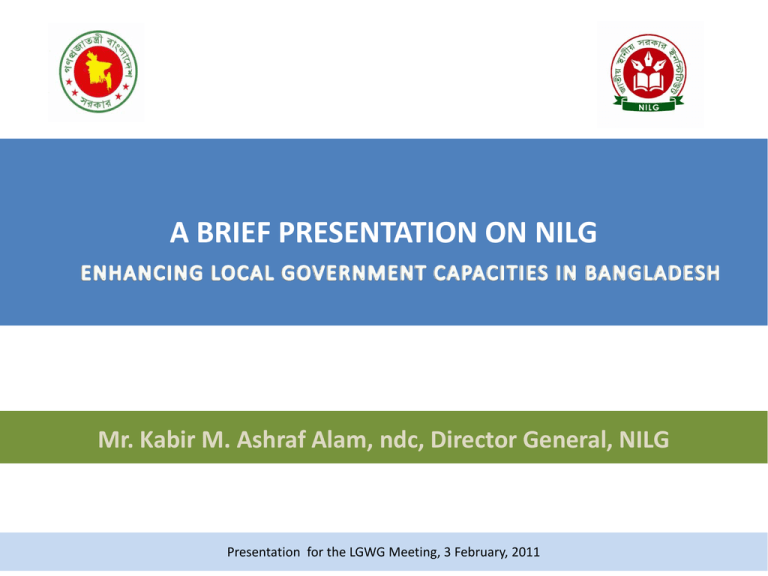
A BRIEF PRESENTATION ON NILG Mr. Kabir M. Ashraf Alam, ndc, Director General, NILG Presentation for the LGWG Meeting, 3 February, 2011 NILG: Mandate THE ONLY MANDATED NATIONAL LEVEL TRAINING AND RESEARCH INSTITUTE OF THE LOCAL GOVERNMENT NILG: Historical Background Local Government Institute was established on 1st July 1969 under the East Pakistan Government Education Institution Ordinance 1961, which was renamed as National Institute of Local Government (NILG) in 1980. NILG is governed by the National Institute of Local Government Act, 1992. Presentation for the LGWG Meeting, 3 February, 2011 2 NILG: Governance NILG governed by a Board of Governors (16 members): The Minister, MoLGRD&C as Chairmen; State Minister, MoLGRD&C as Vice Chairman; Secretary Local Government Division as Member; Director General, NILG as Member Secretary; One member from each of the following institutions: M of Establishment M of Finance RD and Cooperative Division, BPATC, BIAM, BARD, DCC, LGED; and Four elected representative of LGIs (nominated by GoB) Presentation for the LGWG Meeting, 3 February, 2011 NILG: Vision Emerge As A Dynamic, Leading Training, Research, Advocacy Institute and Think Tank In the field of Local Government. NILG: Mission Build capacity of LGIs to provide effective and efficient services for the well-being of all people by developing and conducting training, research and advocacy activities incorporating good governance as a guiding principle. Presentation for the LGWG Meeting, 3 February, 2011 NILG: Objectives Empowering local governments Strengthening democratic decentralization Undertaking research on local governance Supporting various programs and projects for strengthening the capacity of LGIs Presentation for the LGWG Meeting, 3 February, 2011 5 NILG: Strategy Fostering a “Joint Partnership Framework” to develop a common minimum course curricula for union parishads. Linking with local government stakeholders to integrate “lessons learned” on good practices. Networking with other training institutions (i.e. RDA, BARD, BARDTI) to capitalize on experiences/opportunities. Creating a “resource pool” to support cascade training. Presentation for the LGWG Meeting, 3 February, 2011 6 NILG: Undertakings Undertakings of NILG: training to elected and appointed local government functionaries. research and studies on local government and rural development issues. organize national & international events to disseminate lessons learned. knowledge management, publications and quality assurance. certificate courses on different subjects related to local government. Director General Director (Trg. & Consultancy.) Director (Res. & Plan.) Director (Admin. & Cord.) Director (Program & Evaluation) Presentation for the LGWG Meeting, 3 February, 2011 NILG: Training Areas Functions and Responsibilities National Programs Human Resources Management Financial Management of LGIs Resource Mobilization Core Financial Rules and Regulations Development Planning Village Court and Dispute Mitigation Service delivery Presentation for the LGWG Meeting, 3 February, 2011 Presentation for the LGWG Meeting, 3 February, 2011 2008 – 09 2007 – 08 2006 – 07 2005 – 06 2004 – 05 2003 – 04 2002 – 03 2001 – 02 2000 – 01 1999 – 00 1998 – 99 1997 – 98 1996 – 97 NILG: Trainings No. of Trainees 25000 20000 15000 10000 5000 0 NILG: Projects Local Governance Support Project (LGSP) with support from WB, UNDP, UNCDF, DANIDA. Local Government Institution-Capacity Building Project (LGI-CBP) with support from DANIDA. Capacity Building Component of Hygiene, Sanitation and Water Supply (HYSAWA) Project with support from DANIDA. Basic National Capacity Building Program for Strengthening Local Government through the Joint Partnership Framework with support from Swiss Agency for Development and Cooperation (SDC) Preparatory Assistance Project for Strengthening Upazila Parishad (UZP) through Capacity Building Initiatives and Policy Advocacy with support from UNDP. Establish HL Centre, the Secretariat of the Horizontal Learning Program, as an instrument to improve learning from the field. Presentation for the LGWG Meeting, 3 February, 2011 NILG: Flagship Basic National Capacity Building Program for Strengthening Local Government through a Joint Partnership Framework Salient Features: Establishing a national basic course curricula for union parishads through a Joint Partnership Framework that will be used by all sector partners. Incorporating existing replicated good practices of union parishads (identified through the Horizontal Learning Program) into the basic course curricula. Developing a resource pool of local trainers for the training and monitoring of the capacity building of union parishads. THIS SHOW CASES NILG’S DRIVE FOR HARMONIZATION Presentation for the LGWG Meeting, 3 February, 2011 11 Basic National Capacity Building Program: Expected Outputs 1. National Basic Training Curriculum with 9 Modules:- Government and local government in Bangladesh - Office management of Union Parishad - Public administration and coordination - Financial management - Planning and development - Law and justice - Social development - Gender - Media and mass communication 2. National Basic Training Manual 3. Resource Pool: 150 Master Trainers Presentation for the LGWG Meeting, 3 February, 2011 Basic National Capacity Building Program: Activities Performed 1st workshop held on 06-08-09 with BARD, RDA, BRDTI, and DPs to form the Implementation Committee (IC=13) and Technical Working Group (TWG= 15). 2nd workshop held on 08-04-10 with IC and TWG members. Existing curriculum presented (5 modules with 17 sessions). 3rd workshop held on 08-07-10 with NGOs representatives. Revised curriculum presented (7 modules with 55 sessions). 4th workshop held on 19-04-10 with UP elected representatives. Revised curriculum presented (7 modules with 57 sessions). 5th workshop held on 24-08-10 with Academicians. Upgraded curriculum finalized (9 modules with 68 sessions). Now the preparation is going on for writing the manual Presentation for the LGWG Meeting, 3 February, 2011 NILG: Challenges To strengthen the downward accountability to local governments for capacity building. To balance the focus on training with a focus on learning. To measure the impact of training imparted. To identify what else can be done to make local governments more effective. To strengthen the incorporation of “lessons learned” from the field into the training. To create better networks of agencies with different skill sets to promote excellence in local governance. The branding and the sustaining of NILG’s field of expertise. Presentation for the LGWG Meeting, 3 February, 2011 14 NILG: Way forward Strengthen our institutional capacity to excel as a local governance learning and training institution. Develop more strategic action research activities and approaches to improve the quality of training services. Establish pay-and-enroll training programmes to demonstrate our competitive excellence. Initiate an accreditation process to enable local governments to buy-and-sell their own capacity building services. Presentation for the LGWG Meeting, 3 February, 2011 15 THANK YOU


